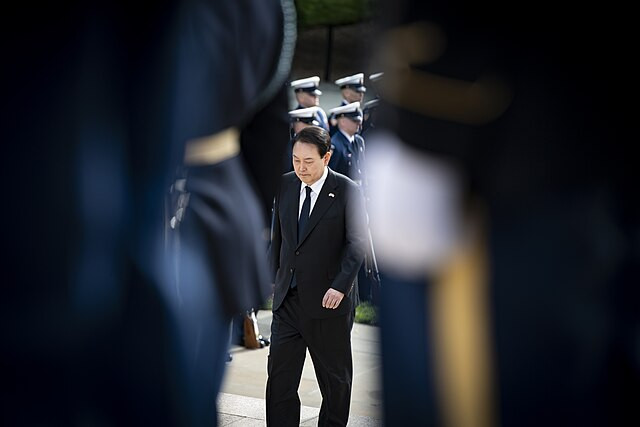A South Korean court has approved an arrest warrant for impeached President Yoon Suk-yeol, escalating a political crisis sparked by his controversial declaration of martial law on December 3. This marks the first time in South Korea's history that an arrest warrant has been issued for a sitting president.
The Seoul Western District Court granted the warrant following a request by the Joint Investigation Headquarters, a coalition of the Corruption Investigation Office for High-ranking Officials (CIO), police, and the Ministry of Defense. The authorities are investigating allegations of insurrection and abuse of power tied to Yoon's short-lived imposition of martial law.
"The arrest warrant and search warrant for President Yoon Suk-yeol, requested by the Joint Investigation Headquarters, were issued this morning," the group said in a statement.
The warrants are valid until January 6, according to Yonhap News Agency. If enforced, Yoon could be held at the Seoul Detention Center while the investigation unfolds. However, the execution of the arrest warrant remains uncertain as the Presidential Security Service, tasked with Yoon's protection, has previously blocked investigative actions, including raids on the presidential office and residence.
Yoon's lawyer, Yoon Kab-keun, denounced the court's decision as "illegal and invalid," arguing that the CIO lacks the authority to investigate insurrection charges. "The arrest warrant and search and seizure warrant issued at the request of an agency without investigative authority are illegal and invalid," the attorney said.
The warrant stems from Yoon's December 3 martial law decree, which was swiftly annulled hours after its announcement. Yoon claimed the move was necessary to address what he described as an "anti-state" opposition attempting to derail his administration's agenda. Critics, however, accused him of orchestrating a power grab.
The National Assembly impeached Yoon on December 14 in a 204-85 vote, citing his martial law declaration as grounds for removal. His presidential powers were immediately suspended, with acting authority transferred to Prime Minister Han Duck-soo. However, Han himself was impeached last week for failing to fill three Constitutional Court vacancies, further complicating the nation's leadership crisis. Deputy Prime Minister and Finance Minister Choi Sang-mok now serves as the interim leader.
Kweon Seong-dong, acting leader of Yoon's People Power Party, criticized the arrest warrant as inappropriate. "Attempting to detain a sitting president is not only unprecedented but also sets a troubling precedent," Kweon said.
South Korea's constitutional court has up to six months to decide whether to uphold Yoon's impeachment or reinstate him as president. If the court confirms his removal, the country would hold a presidential election within 60 days.
Yoon faces possible life imprisonment or even the death penalty if convicted of insurrection, one of the few charges for which South Korean presidents do not enjoy immunity.
The martial law declaration and its fallout have plunged the nation into weeks of political unrest, with rival factions of supporters and protesters gathering outside Yoon's residence. Police were deployed early Tuesday to prevent scuffles between the groups.
While Yoon has remained defiant, claiming the martial law order was an act of governance, the investigation has led to mounting scrutiny of his administration. The political turbulence has rattled financial markets and disrupted diplomatic engagements, amplifying concerns about South Korea's stability.
In response to the court's ruling, the Presidential Security Service stated it would handle the warrant in accordance with legal processes. However, under South Korean law, locations tied to military secrets cannot be searched without the consent of the individual in charge, complicating any potential attempts to detain Yoon.






